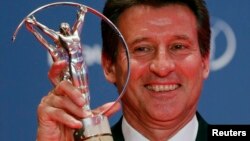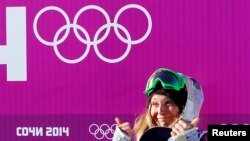SOCHI, RUSSIA —
Olympic boycotts are absurd and serve no political purpose, Britain's Sebastian Coe said on Thursday, reflecting on the Cold War era when he won his two gold medals.
Some rights groups had called for a boycott of the Sochi Winter Games in protest over Russia's treatment of gays, but that demand has gone unheeded.
Coe won the 1,500 meters in Moscow in 1980 and Los Angeles in 1984. Both Games were blighted by boycotts, with the Americans staying away from Moscow after the Soviet invasion of Afghanistan and the Soviet Union refusing to compete four years later.
Coe, now chairman of the British Olympic Association, said such protests were futile and hurt athletes.
“They are absurd. They fly in the face of any sensible political judgment,” he told reporters.
“Certainly at an Olympic level they have never remotely achieved what they set out to do other than to penalize the competitor,” he added.
A number of Western leaders have said they will not attend the Feb. 7-23 Games in what is being interpreted as a criticism of Russia's record on human rights.
Security fears and complaints over accommodation have also overshadowed the build-up, the kind of issues familiar to Coe in his previous role as chairman of the London 2012 organizing committee.
Coe carried the Olympic torch on Thursday and said he was impressed by what he had seen in Sochi.
“Actually there was a great atmosphere on the streets, lots of kids, lots of people out there,” he said.
“I think I was probably marginally slower than my last Olympic run in this country 34 years ago.”
Some rights groups had called for a boycott of the Sochi Winter Games in protest over Russia's treatment of gays, but that demand has gone unheeded.
Coe won the 1,500 meters in Moscow in 1980 and Los Angeles in 1984. Both Games were blighted by boycotts, with the Americans staying away from Moscow after the Soviet invasion of Afghanistan and the Soviet Union refusing to compete four years later.
Coe, now chairman of the British Olympic Association, said such protests were futile and hurt athletes.
“They are absurd. They fly in the face of any sensible political judgment,” he told reporters.
“Certainly at an Olympic level they have never remotely achieved what they set out to do other than to penalize the competitor,” he added.
A number of Western leaders have said they will not attend the Feb. 7-23 Games in what is being interpreted as a criticism of Russia's record on human rights.
Security fears and complaints over accommodation have also overshadowed the build-up, the kind of issues familiar to Coe in his previous role as chairman of the London 2012 organizing committee.
Coe carried the Olympic torch on Thursday and said he was impressed by what he had seen in Sochi.
“Actually there was a great atmosphere on the streets, lots of kids, lots of people out there,” he said.
“I think I was probably marginally slower than my last Olympic run in this country 34 years ago.”






